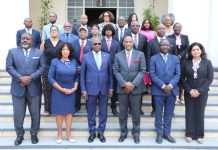Africa-Press – Angola. The head of the European Union (EU) delegation in Angola highlighted, Tuesday (22), in Luanda, the country’s important progress in the management of Public Finances, especially in the areas of Control, Inspection and Execution.
Ambassador Jeannette Seppen was speaking at the presentation ceremony of the Civil Society Online Platform for Budget Simplification and Analysis PALOP-TL (Portuguese-speaking African Countries and East Timor) “e-Budget”.
According to the EU representative, quoted by Lusa, Angola has made important progress as a result of the ongoing reforms for macroeconomic stabilization.
Among the advances already made, Jeannette Seppen highlighted the reform of the legal framework, the timely and frequent publication of reports on the use of budgetary resources, the level of audits of national accounts by the Court of Auditors, measures to rationalize public expenditure, with significant gains in non-oil tax revenue and a notable decrease in non-essential expenditures.
The official also cited the fiscal policy measures, which still allowed in 2021 a significant reduction in the public debt-to-Gross Domestic Product ratio. “These progress is an indicator of the positive trajectory of change, which the country has been registering in its Public Finance management system and is a clear sign that it intends to move forward in a determined way to achieve the consolidation of external and fiscal balance. of the Angolan economy”, he said.
According to the EU representative in Angola, these reforms also indicate that the country intends to create the conditions for an effective diversification of the economy, in order to promote sustained and sustainable growth. The field of Public Finance has been one of the privileged areas in EU cooperation with Angola, whether at a regional level with the PALOP-TL, as in the case of this project, or also in the context of bilateral cooperation with other interventions, underlined Jeannette Seppen.
“Aware of the enormous importance of public finance management for sustainable economic and social development and in the context of good economic governance, the EU has been giving priority to interventions in these areas”, he said.
The EU representative in Angola said that the aim is to adopt the best internationally recommended practices and invest in new technologies, in particular digitalisation, with tools and instruments for overcoming technological stages for developing countries, with civil society being one of the essential foundations of this process, in the proximity of the citizen and the defense of their rights.
Despite the growing “and increasing and intense” presence of civil society organizations and institutions, such as universities, business associations, in these processes, “the participatory role of civil society organizations in the processes of discussion, analysis and decision of budgets and of public accounts has been reduced and their capacities need to be strengthened”, considered Jeannette Seppen.
“In this sense, this platform that we launched today (yesterday) aims to constitute another instrument to support the intervention of this invaluable group and at the same time a tool to promote budget transparency in the management of public accounts”, he stressed.
The area of Public Finance “has been one of the main focuses of EU support in the last decade and will continue to be so in the framework of both regional and bilateral programming, for the period 2021-2027. There are three years left to reach all the goals of the 20 -30,” he added.
For More News And Analysis About Angola Follow Africa-Press






